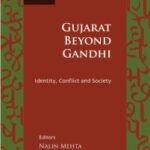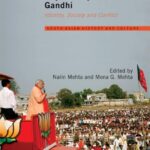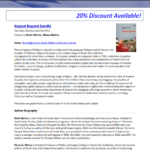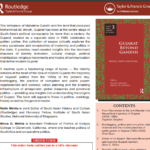Buy This Book From
The birthplace of Mahatma Gandhi and the land that produced Mohammad Ali Jinnah, the founder of Pakistan, Gujarat has been at the centre-stage of South Asia’s political iconography for more than a century. As Gujarat, created as a separate state in 1960, celebrates its golden jubilee this collection of essays critically explores the many paradoxes and complexities of modernity and politics in the state. The contributors provide much-needed insights into the dominant impulses of identity formation, cultural change, political mobilisation, religious movements and modes of communication that define modern Gujarat.
This book touches upon a fascinating range of topics – the identity debates at the heart of the idea of modern Gujarat; the trajectory of Gujarati politics from the 1950s to the present day; bootlegging, the practice of corruption and public power; vegetarianism and violence; urban planning and the enabling infrastructure of antagonism; global diasporas and provincial politics – providing new insights into understanding the enigma of Gujarat. Going well beyond the boundaries of Gujarat and engaging with larger questions about democracy and diversity in India, this book will appeal to those interested in South Asian Studies, politics, sociology, history as well as the general reader.
This book was first published as a special issue of South Asian History and Culture.


PRAISE FOR GUJARAT BEYOND GANDHI
answers the question [about Gujarat] insightfully and comprehensively…helps us to understand… better by dissecting the various dimensions of contemporary Gujarat…
— Frontline, Nov. 5-18, 2011provide much-needed insights into the dominant impulses of identity formation, cultural change, political mobilisation, religious movements and modes of communication that define modern Gujarat.
— Press Trust of India, 4 July 2010touches upon a fascinating range of topics …providing new insights into understanding the enigma of Gujarat
— Indian Express, 3 July 2011The essays…. are written from varying theoretical perspectives but have in common a critical outlook….[and] often penetrating analytical insights.
— Vinay Lal in Book Review, Aug-Sep. 2011The editors have traced the evolution of the assertive Hindu Gujarati identity very clearly… the articles are well researched and insightful.
— Book Link, July 2011TABLE OF CONTENTS
1.From Navnirman to the anti-Mandal riots: the political trajectory of Gujarat (1974–1985), Nagindas Sanghavias Sanghavi
2. Bootlegging, politics and corruption: state violence and the routine practices of
public power in Gujarat (1985–2002), Ornit Shani
3. A river of no dissent: Narmada Movement and coercive Gujarati nativism, Mona G. Mehta
4. Special political zone: urban planning, spatial segregation and the infrastructure of violence in Ahmedabad, Arvind Rajagopal
5. On the political uses of disgust in Gujarat, Parvis Ghassem-Fachandi
6. Ashis Nandy vs. the state of Gujarat: authoritarian developmentalism, democracy and the politics of Narendra Modi, Nalin Mehta
7. Soteriological journeys and discourses of self-transformation: the Tablighi Jamaat and Svadhyaya in Gujarat, Anindita Chakrabarti
8. An ‘Imagined Community’ in diaspora: Gujaratis in South Africa, Goolam Vahed
Download UK Ed. Flyer 
Download India Ed. Flyer



